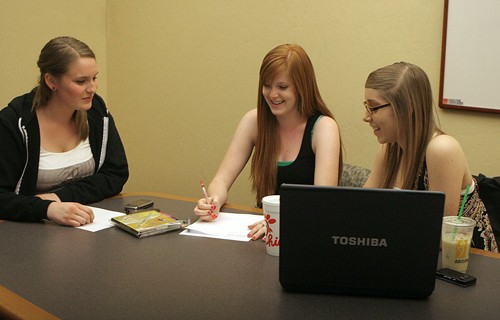UA students living with diabetes can now find a support system in DiabetiCATS, a new campus club.
Carissa Forstie, a chemistry freshman, and Rose Dodd, a pre-physiology freshman, founded the club as a support group and awareness initiative. Both are diabetic and had difficulty finding other students who could relate to their experience.
The two were united during class last fall when Dodd noticed Forstie’s medical bracelet. Dodd asked Forstie about it and was surprised to find she was also diabetic.
Both students noted a lack of services for college-aged diabetics. Children with diabetes have the opportunity to attend special camps and support groups, but “”age out”” of the system at 18.
“”There are a lot of resources when you’re young, but once you’re in college that goes away,”” Forstie said.
DiabetiCATS members share tips and advice about managing a condition that can be treated but not cured.
“”Basically it’s just a support system,”” Forstie said.
Diabetics must make lifestyle adaptations that can be foreign to other students, according to Linda Lundergan, a Campus Health Services physician.
Many students are unconcerned with what they eat for lunch or what time they grab a snack. Diabetic students, however, must plan their meals carefully and take into account the amount of calories and carbohydrates they consume.
“”You have to be very organized about what you eat and how much insulin you give,”” Lundergan said. “”It’s pretty time-consuming and a little inconvenient.””
Diabetic people must also monitor their blood sugar levels and be prepared in case of problems.
Campus Health Services allows diabetic students to visit physicians and have their blood work done on campus, as well as provide referrals to local endocrinologists.
Dodd said DiabetiCATS supplements the services offered by the UA.
“”Besides the medical aspect of it, I haven’t seen anything,”” Dodd said. “”Even though we’re grown-ups, we still need support.””
Forstie and Dodd are working to recruit other diabetic students. The task is difficult because medical information cannot be released by the university.
“”It’s been hard to find people with diabetes. There’s no way of tracking them down,”” Forstie said.
Club members participated in the Juvenile Diabetes Research Foundation International Walk to Cure Diabetes. They also plan on fundraising for diabetes research and volunteering in the Tucson community.
Dodd and Forstie hope the club will expand to include non-diabetic students as well.
Many students have friends, siblings or roommates with diabetes, yet they do not fully understand the effects of the condition. Dodd and Forstie want to provide information about their lifestyle and teach non-diabetics practical skills, like how to use a glucagon kit if a diabetic passes out.
“”Spreading the awareness is such a big thing,”” Dodd said.
Forstie and Dodd started informal DiabetiCATS meetings in October and ASUA officially recognized the club in February.
Interested students are invited to attend a DiabetiCATS meeting or join the Facebook group, DiabetiCATS at UA.









